Social Impact Assessments and Progress Reports
Project to Prevent Litter Contamination of the Natural Environment
As of October 15th, 2025
| Project name |
Creation of a litter research and countermeasure action network to address the problem of litter leakage into the natural environment in Japan and overseas |
|---|---|
| Grant amount |
98,068,000 yen |
| Recipient |
Pirika, Inc. ("Pirika", Head Office: Shibuya Ward, Tokyo) |
| Issue-finder |
Fujio Kojima, Representative Director and CEO |
| Social issue targeted |
Litter contamination of the natural environment in Japan and overseas |
| Press release |
Social issue: Litter leakage into the natural environment has reached an alarming scale!
In recent years, increasing quantities of litter, especially plastic, have contaminated the natural environment. This is causing widespread negative impacts in many areas, including ecosystems and industries. Like climate change, it is becoming an issue that no nation or company can afford to ignore. However, there is a significant difference from the climate change problem in the sense that there are no clearly defined methods to measure the litter contamination of the natural environment.
Pirika is a start-up company developing various services related to waste collection and litter research. Its "Takanome" service is designed to quantitatively grasp the litter situations in Japan and overseas and uses AI to survey litter distribution, including the amounts and types of litter, based on images of street litter taken by smartphone cameras installed on vehicles. The "Pirika" SNS anti-litter social platform, which boasts one of the highest number of app downloads in the world, provides a mechanism to collect and distribute information about grass-roots voluntary litter-picking activities, and their results can be observed on a single website. This platform also provides an efficient way to quantify litter-picking. Data from the platform shows that a cumulative total of 350 million pieces of litter had been picked up in 130 countries by May 2024.
Through these services, Pirika provides cleaning/litter-picking organizations, NPOs, government agencies, local governments, and other organizations with research reports about street litter, as well as proposals on litter reduction. It also uses its data to promote litter-picking activities and other countermeasures.
Through Mitsui & Co. Co-creation Fund, Mitsui will support the creation of a litter research and countermeasure action network covering Japan, North America, Europe, and Southeast Asia, using the assets and networks of Mitsui's domestic and overseas road transportation and logistics business, and thereby contribute to the acceleration of a global cycle leading to the solution of the problem of litter contamination of the natural environment in Japan and overseas.
Social Impact Assessments (Logic Model and KPIs)
Dialogue between issue finder and co-creator
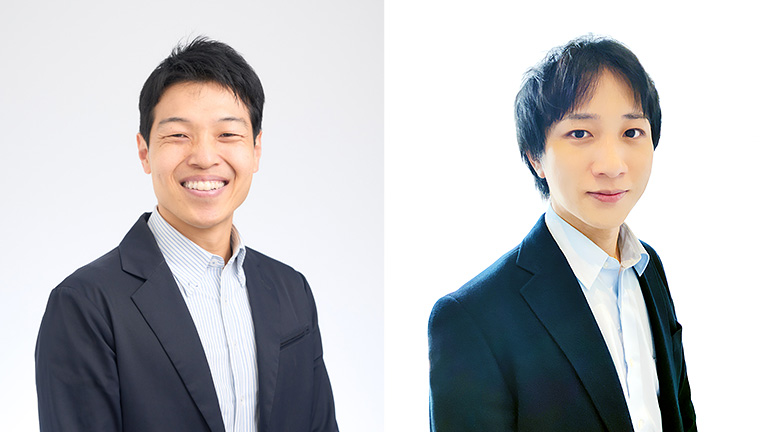
Interviewer: Junichiro Ishida (Mitsui & Co., right)
Interviewee: Fujio Kojima (Pirika, Inc., left)
Ishida: Mr. Kojima, would you begin by telling us what inspired you to start up Pirika?
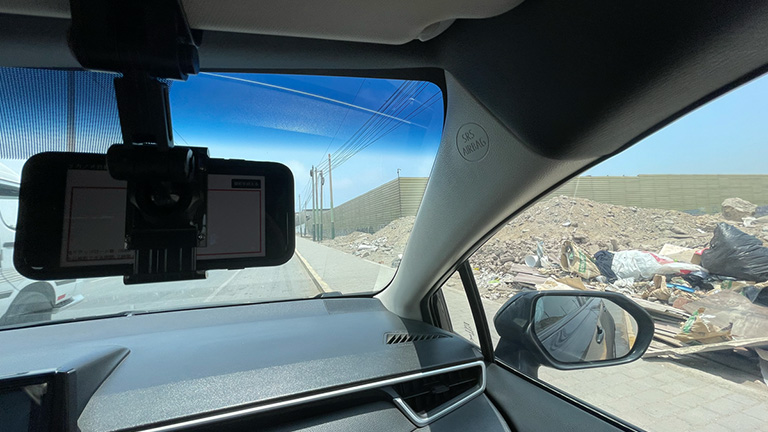
Kojima: Half a year into my postgraduate studies, I took a break to travel the world. I was shocked to find that litter was increasingly contaminating the natural environment on an alarming scale in every country that I visited. This issue tends to be overlooked in Japan, but it’s a serious problem that can have direct impacts on people’s lives in regions with fragile environmental infrastructure. That’s why I founded Pirika in 2011 to use the power of technology to tackle the global litter problem.
Ishida: So you started up the company after seeing the realities on the ground. I can tell you’re obviously very passionate about this.
Ishida: How did you learn about the Mitsui & Co. Co-creation Fund?
Kojima: I’d heard about the Fund before through an acquaintance working at Mitsui & Co. However, I initially assumed that stock companies are not eligible for grants. One day, however, a person working for the Mitsui & Co. Co-creation Fund told me that they provided grants to social startups. I felt compelled to rise to the challenge of applying to the Fund and we set things in motion.
Ishida: What was your impression of the Mitsui & Co. Co-creation Fund after actually using it?
Kojima: Initially I thought it would be great just to receive financial support. However, I was very encouraged to find that we were given a range of support beyond funding that would really accelerate our project, which is very reassuring for us. Our partners at Mitsui & Co., especially yourself, Mr. Ishida, our co-creator, have provided advice from a frontline perspective and given us access to Mitsui’s global networks. I found these things also valuable in addition to the funding.
Ishida: I’m glad it is encouraging for you to be able to receive different kinds of support than before through co-creation with Mitsui & Co. You can certainly leverage Mitsui’s retail-related assets and networks inside and outside Japan.
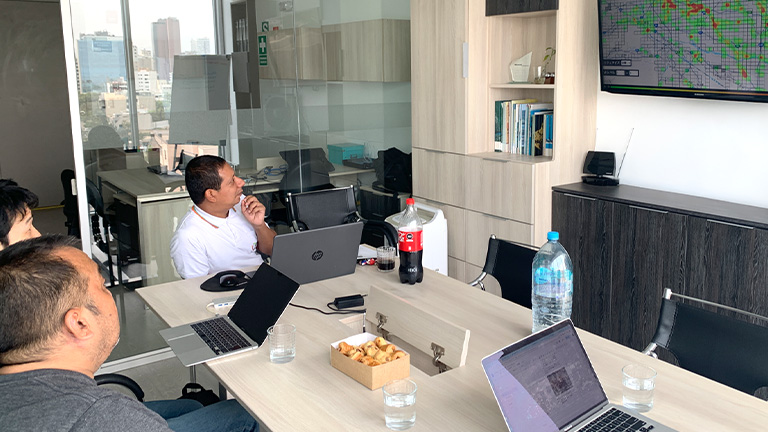
Ishida: What are your expectations toward your co-creators, and what value is being created through collaboration?
Kojima: By working with people who have knowledge about technology and retail/logistics infrastructure, we are able to find solutions for problems that we could not have tackled alone. For example, Mitsui & Co.’s networks and expertise enabled us to install the Takanome app on delivery vehicles serving retailers and the food service industry to visualize litter.
Ishida: By launching surveys using the Mitsui & Co. group’s vehicles, we were able to expand the areas covered. I think that was an important achievement.
Ishida: What do you need for solving this specific issue, beyond the support of the Mitsui & Co. Co-creation Fund?
Kojima: I think we need more people to take an interest in this issue and work toward solutions from their own perspectives. Because it’s not a problem that can be addressed by specific industries or organizations, we want to accelerate cross-sector collaboration.
Ishida: I share your view that it’s important to lay the groundwork for efforts to tackle the litter problem, and that you need to increase the number of people involved so that they can find solutions from their own perspectives.
Ishida: What are your expectations toward the future role of the Mitsui & Co. Co-creation Fund as well as its ecosystem?
Kojima: I hope that co-creation will result in a chain reaction of collaboration and learning, leading to accelerated efforts to tackle social issues. It would be great if our litter visualization project becomes an inspiration as a successful example for other people to take on challenges.
Ishida: I totally agree. I’ve learned a lot through our co-creation activities with you. I hope that the Mitsui & Co. Co-creation Fund will continue to provide opportunities for issue finders and co-creators to take on challenges together, and that our project will be a kind of impetus for future generations.
Ishida: Finally, what are your goals during the grant period and thereafter?
Kojima: Within Japan, we aim to expand our collaboration with the retail and food service industries in order to create a more efficient survey structure. In other countries, including the United States, we want to accumulate case studies and work with governments and NPOs to create an environment in which litter visualization can be reflected in public policies. In addition, we will work to create a viable business model so that we can continue to operate independently after the end of the grant period.
Ishida: We will continue to work alongside you toward the realization of your goals. Thank you for your time today.
Activity Highlights
1. Start of survey using Mitsui & Co. Group vehicles
By using Mitsui & Co. Group vehicles, the survey area was expanded to include the Kanto, Kansai, and Kyushu regions. This has resulted in the creation of the largest survey structure since the introduction of the Takanome service.
2. Collaboration with four central and local governments in Japan (against a target of 10)
Pirika has expanded its survey network through collaboration with Mie Prefecture, Shiga Prefecture, and Abashiri City, and the adoption of its social implementation program by the Tokyo Metropolitan Government (as of July 2025). There are more local governments that are currently considering the introduction of the program.
3. Seven countries overseas surveyed (against a target of five)
The cumulative travel distance for surveys in 13 cities in seven countries has reached approximately 3,000km (as of July 2025). Pirika has started to develop the NPO and government markets in collaboration with an NPO in Hawaii and is currently working to build a track record in mainland North America.
4. Three releases (against a target of six)
Against its initial target of six releases for the period to March 2026, Pirika had issued three releases as of August 2025, consisting of one when Pirika was selected for a startup support program, and two concerning the expansion of its survey work in Japan and overseas. It is currently exploring the possibility of press releases in conjunction with its partners.
5. One case of collaboration with an international organization (against a target of two)
Collaboration with JICA has resulted in the introduction of the Takanome system by a local government in Peru. Local governments in adjoining areas are also considering the introduction of the system.
Mitsui’s Materiality
“Build brighter futures, everywhere” as our corporate mission, and to gain the trust and expectations of our stakeholders to realize a better tomorrow for earth and for people around the world, we have identified six material issues (“Materiality”) for Mitsui’s sustainable growth. We anticipate this particular project/ business to contribute especially to the realization of “Foster a well-being society” and “Empower our people to build brighter futures”
-
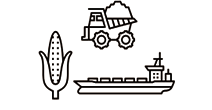
Establish a foundation for sustainable and stable supply
-
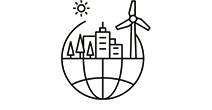
Create a community coexisting with nature
-
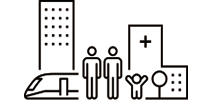
Foster a well-being society
-
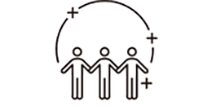
Cultivate societies that respect human rights
-
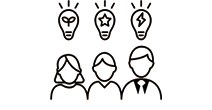
Empower our people to build brighter futures
-
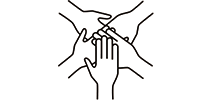
Build an organization with integrity